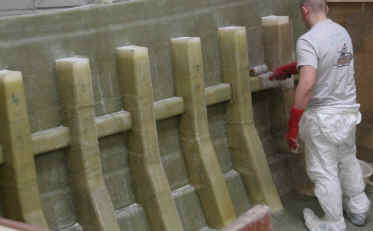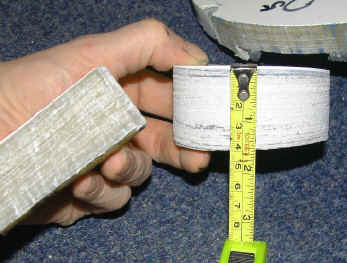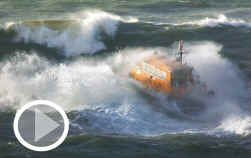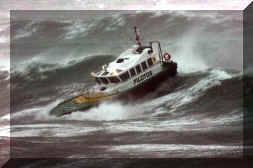| PROFESSIONAL
PILOT BOATS
WE ARE WORLD LEADERS IN PILOT BOATS, 20 VESSELS SUPPLIED TO PORTS WORLDWIDE IN THE LAST 6 YEARS CONSTRUCTION & STRENGTH
|
|||||
|
Our GRP hulls are
tremendously strong, GRP is an excellent construction medium. All our
vessels hull have full plan approval from either Lloyds or BV, and
scantling determination is carried out using Lloyds SSC software. We
only use single skin composite laminates, as for a pilot vessel the risk
of delaminating over the long lifespan of the vessel with cored
structures is to high, not to mention the difficulty in effecting a
repair years latter. We use high strength compisite laminates in a heavy
duty lay up, typically our pilot vessels will have a bottom laminate of
9,000gm2+ with keel laminates over 11,000gm2. In
addition to comply with Lloyds Part 8 3.6.5,
the side shell laminate is increased locally from the bow to just
aft of amidships where maximum beam occurs by 50% of the side shell
laminate down to the first longditudal stringer (500mm below the
sheerline). And the transom boundary is increased by 50% of the shell
laminate 1m f/wd and across the transom from the quarters down to the
chine.
Below, typical cut outs showing how thick and correspondingly strong the GRP shell laminate is in paces.
Superiority
of
GRP over Aluminium
& Steel Hulls Strength-
comparing steel to GRP, weight for weight a modern GRP composite
structure is stronger than steel, therefore a well designed composite
GRP hull structure utilizing combination composites (multi axial and uni-directional
fibres) will be close to steel in strength yet be much lighter than a
comparable steel vessel, however one of the great advantages of GRP is
that thickness and strengthening can be concentrated exactly where it is
required by locally increasing thickness at specific areas, something
that can not easily be done with steel. In pilot boarding impacts it is
the vessels fenders that absorb the impact cushioning loadings on the
hull structure, therefore that so long as the vessel is adequately
fendered, which the interceptor is, then the advantage of steel in
strength is effectively neutralized. Although
steel hull’s attribute to a lower cost of construction, it has some
distinct disadvantages: Weight The
steel vessel will weigh considerably more than an aluminium or GRP
vessel, this results in larger engines being need to power the vessel
with a very significant increase in fuel consumption and running costs
(especially so in today's environmentally conscious environment).
Therefore there is a distinct disadvantage attributed to the weight
penalty when dealing with a high speed craft. Maintenance As
steel is very prone to corrosion, yearly re-painting will be required
adding to service and maintenance costs. Superiority
over Aluminium Hulls Aluminium
has advantages over steel in weight; however these advantages do not
apply when compared to GRP. We
believe, GRP being a homogeneous structure, without welds and sheet
panel joins that can introducing stress areas, and without any concerns
over electrolysis and dissimilar metal corrosion that it is superior to
aluminium. Furthermore, maintenance and repair does not require
specialised skilled personnel as is needed with aluminium (skilled
aluminium welders). Good GRP repair and maintenance work can be easily
affected. Furthermore GRP produces a vessel of superior acetic finish,
its surface gell coat is of high gloss, and there is no ‘starved
dog’ appearance as occurs when welded frames in time show through on
an aluminium hulls construction. In addition maintenance costs are
greatly reduced as there is not re-painting required over the vessels
life, as is the case with painted aluminium vessels. Other
Considerations for GRP Hulls The
life of the vessels GRP structure should easily reach 15-20 years. One
important consideration in GRP boat production is the tooling costs to
design and manufacture the necessary moulds to build a GRP vessel. Many
companies cannot afford this investment or are not prepared to invest in
the appropriate tooling etc. SHM however has demonstrated that we are
prepared to invest in tooling to build superior GRP vessels.
Safehaven Marine, Ashgrove, Cobh, Co Cork, Ireland Phone 00353 86 8054582 Email- info@safehavenmarine.com safehavenmarine@eircom.net
|
All our vessels are build to the highest standards of strength & engineering and are renowned world wide for their exceptional sea keeping abilities. For the best, most extreme, rough weather demonstration videos of our boats, see our amazing selection on you tube.
BEST ROUGH WEATHER ACTION PHOTOS We don't just claim our boats have the best sea keeping abilities, here's the proof |
||||
| CERTIFICATION | |||||
|
See all our previous professional PILOT vessels |
|||||
|
See our spectacular rough weather video's |
|||||
|
See our recent newsletter |
|||||
|
WORK FORCE |
|||||




